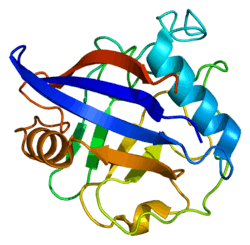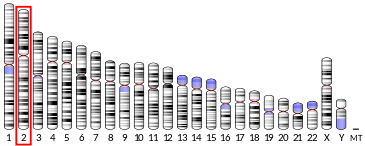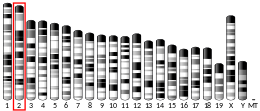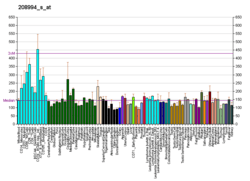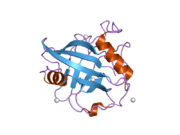PPIG (gene)
Peptidyl-prolyl cis-trans isomerase G is an enzyme that in humans is encoded by the PPIG gene.[5][6][7]
Interactions
References
- 1 2 3 GRCh38: Ensembl release 89: ENSG00000138398 - Ensembl, May 2017
- 1 2 3 GRCm38: Ensembl release 89: ENSMUSG00000042133 - Ensembl, May 2017
- ↑ "Human PubMed Reference:".
- ↑ "Mouse PubMed Reference:".
- ↑ Nestel FP, Colwill K, Harper S, Pawson T, Anderson SK (Jan 1997). "RS cyclophilins: identification of an NK-TR1-related cyclophilin". Gene. 180 (1–2): 151–5. doi:10.1016/S0378-1119(96)00436-2. PMID 8973360.
- ↑ Bourquin JP, Stagljar I, Meier P, Moosmann P, Silke J, Baechi T, Georgiev O, Schaffner W (Jul 1997). "A serine/arginine-rich nuclear matrix cyclophilin interacts with the C-terminal domain of RNA polymerase II". Nucleic Acids Res. 25 (11): 2055–61. doi:10.1093/nar/25.11.2055. PMC 146702. PMID 9153302.
- ↑ "Entrez Gene: PPIG peptidylprolyl isomerase G (cyclophilin G)".
- ↑ Lin, Chun Lun; Leu Steve; Lu Ming Chu; Ouyang Pin (Aug 2004). "Over-expression of SR-cyclophilin, an interaction partner of nuclear pinin, releases SR family splicing factors from nuclear speckles". Biochem. Biophys. Res. Commun. United States. 321 (3): 638–47. doi:10.1016/j.bbrc.2004.07.013. ISSN 0006-291X. PMID 15358154.
Further reading
- Strausberg RL, Feingold EA, Grouse LH, et al. (2003). "Generation and initial analysis of more than 15,000 full-length human and mouse cDNA sequences". Proc. Natl. Acad. Sci. U.S.A. 99 (26): 16899–903. Bibcode:2002PNAS...9916899M. doi:10.1073/pnas.242603899. PMC 139241. PMID 12477932.
- Dubourg B, Kamphausen T, Weiwad M, et al. (2004). "The human nuclear SRcyp is a cell cycle-regulated cyclophilin". J. Biol. Chem. 279 (21): 22322–30. doi:10.1074/jbc.M400736200. PMID 15016823.
- Beausoleil SA, Jedrychowski M, Schwartz D, et al. (2004). "Large-scale characterization of HeLa cell nuclear phosphoproteins". Proc. Natl. Acad. Sci. U.S.A. 101 (33): 12130–5. Bibcode:2004PNAS..10112130B. doi:10.1073/pnas.0404720101. PMC 514446. PMID 15302935.
- Jin J, Smith FD, Stark C, et al. (2004). "Proteomic, functional, and domain-based analysis of in vivo 14-3-3 binding proteins involved in cytoskeletal regulation and cellular organization". Curr. Biol. 14 (16): 1436–50. doi:10.1016/j.cub.2004.07.051. PMID 15324660.
- Lin CL, Leu S, Lu MC, Ouyang P (2004). "Over-expression of SR-cyclophilin, an interaction partner of nuclear pinin, releases SR family splicing factors from nuclear speckles". Biochem. Biophys. Res. Commun. 321 (3): 638–47. doi:10.1016/j.bbrc.2004.07.013. PMID 15358154.
- Gerhard DS, Wagner L, Feingold EA, et al. (2004). "The status, quality, and expansion of the NIH full-length cDNA project: the Mammalian Gene Collection (MGC)". Genome Res. 14 (10B): 2121–7. doi:10.1101/gr.2596504. PMC 528928. PMID 15489334.
- Rual JF, Venkatesan K, Hao T, et al. (2005). "Towards a proteome-scale map of the human protein-protein interaction network". Nature. 437 (7062): 1173–8. Bibcode:2005Natur.437.1173R. doi:10.1038/nature04209. PMID 16189514.
- Olsen JV, Blagoev B, Gnad F, et al. (2006). "Global, in vivo, and site-specific phosphorylation dynamics in signaling networks". Cell. 127 (3): 635–48. doi:10.1016/j.cell.2006.09.026. PMID 17081983.
- Davis TL, Walker JR, Campagna-Slater V, et al. (2010). "Structural and biochemical characterization of the human cyclophilin family of peptidyl-prolyl isomerases". PLoS Biol. 8 (7): e1000439. doi:10.1371/journal.pbio.1000439. PMC 2911226. PMID 20676357.
This article is issued from
Wikipedia.
The text is licensed under Creative Commons - Attribution - Sharealike.
Additional terms may apply for the media files.
